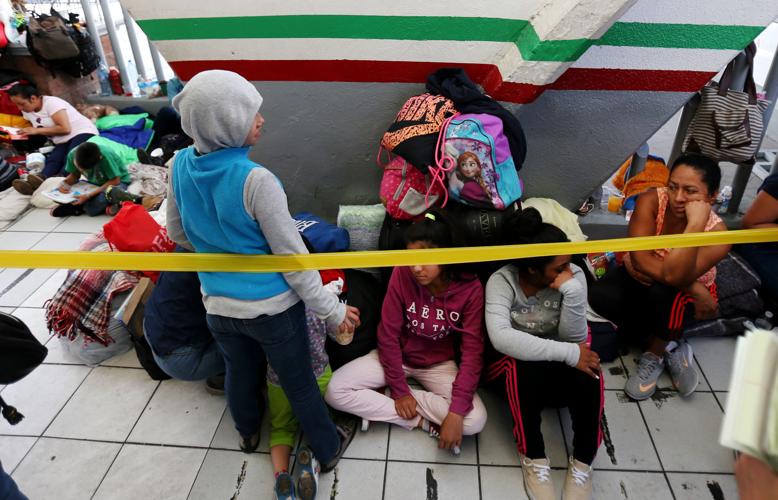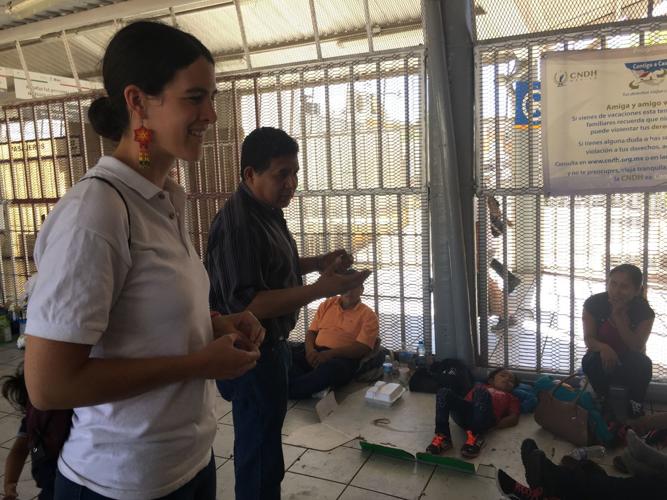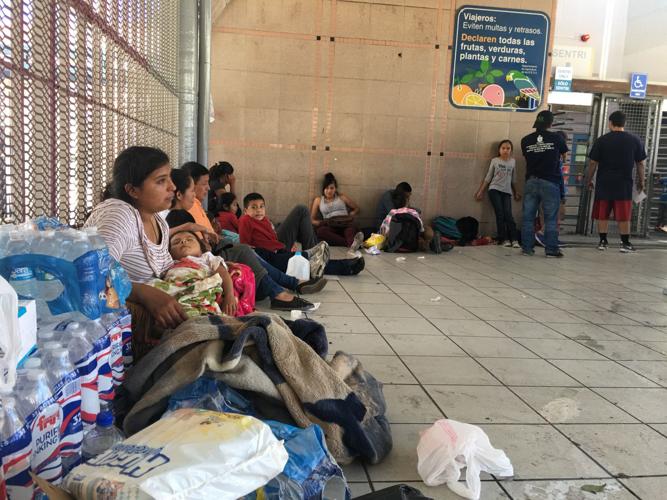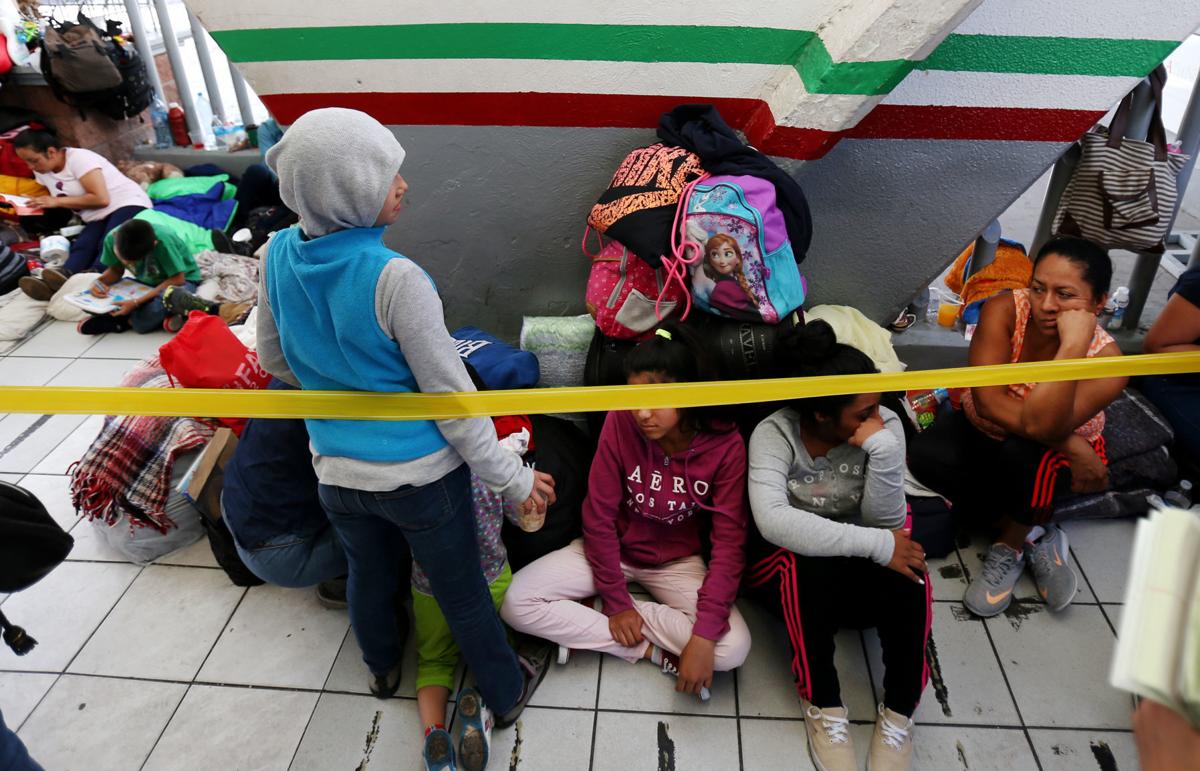The month-to-month numbers of families and minors being processed at Arizona’s ports of entry don’t tell the full story of why some wait up to two weeks for an opportunity to ask for asylum, officials said Monday.
“Arizona is one of the most understaffed field offices that we have,” said Todd Owen, executive assistant commissioner for the Customs and Border Protection Office of Field Operations.
“The port of Nogales has 142 vacancies themselves. We temporarily reassigned officers from elsewhere to help deal with the responsibilities down there. So the variables will change month-to-month as to what we can handle and what we cannot,” he said.
Since mid-May, the line of people waiting at the Nogales port of entry for a shot at seeking refuge in the United States has grown as the wait gets longer.
In June, there were 742 parents or guardians and their children processed at Arizona’s ports of entry, along with 143 minors who arrived alone. That’s down from about 1,000 families and 169 unaccompanied minors in May, CBP figures show.
The number of people processed, though, is not that different than in December, when there were 1,036 families and 217 unaccompanied minors who came through. There weren’t any lines then.
But at the same time, Owen said, drug interdiction in Nogales has “greatly exceeded” last year’s numbers, which pulls resources and focus from competing responsibilities. “When you look at the decisions being made, you have to take the totality into what we are seeing in these ports of entry and not simply go based on number of migrants in December versus number in May,” he said.
He said customs officers can’t pull resources from other missions “and direct everything to this single priority. We have to balance resources every day.”
Over the last few weeks, the binational organization Kino Border Initiative has coordinated efforts in Nogales to have some families move to area shelters on the Mexican side to keep them from the blistering heat and from sleeping on the floor outside the pedestrian area of the port of entry for days at a time.
The group still hasn’t heard what it considers a legitimate explanation from CBP about why it is able to process fewer people than in the past, said Joanna Williams, director of education and advocacy.

Johanna Williams with the Kino Border Initiative speaks on Monday to a group of mostly Guatemalan parents and their children who started to arrive in Nogales on Saturday to present themselves at the port of entry to seek asylum.
While people started waiting a few days to be let in, it soon turned to a week, then up to two weeks as CBP processed a few families at a time. On a daily basis, there are 90 to 100 asylum seekers waiting, Williams said.
“We continue to be completely overwhelmed tending to the humanitarian needs,” she said.
Kino Border Initiative has now set up five places where families can wait, including ad hoc shelters.
Owen said during a phone call with reporters Monday that his agency tries to process people as quickly as possible, but is also limited by what Immigration and Customs Enforcement, which is charged with transporting and detaining them, can do and the space it has.
The aim of the call was to address what officials consider misinformed reports of the “zero-tolerance” border enforcement policy leading to separations at the ports of entry.
From May 6 through July 2, there have been 5,298 individuals who presented themselves at ports of entry along the U.S.-Mexico border as part of family units, Owen said.
Out of those, parents have been separated from their children in seven cases where they either tried to enter without inspection or the parent had some type of criminal history (aggravated assault conviction, financial crimes, drug conviction or prior removal).
“Family separation is a rare event” at the ports, Owen said, adding that the zero-tolerance policy has no impact on how CBP carries out its mission at ports of entry.
“If you arrive at the port of entry seeking asylum you have not committed an illegal act, it is a lawful way to present yourself,” he said.
All CBP does is document the claim, process the person and turn them over to ICE, where they can present their case before an asylum officer. It does not deny claims at the ports.
There have been multiple reports of customs officers turning people away at ports of entry, saying they can’t be processed at that time, in addition to ports such as Nogales facing growing lines.
A lawsuit has been filed by the ACLU, which represents families who entered at ports of entry to seek asylum and had their children taken away, including a Congolese mother who was separated from her 7-year-old daughter for four months.
Owen said officials only separate families under very specific circumstances and to protect the well-being of a child. These are if the parent/guardian: is unfit or represents a danger to the child; has a criminal history to include prior immigration offenses; entered without inspection or tried to smuggle drugs and is charged criminally; has an outstanding warrant from a law enforcement jurisdiction in the country; has a communicable disease; or makes a fraudulent claim of parental or legal guardianship.
The decision, he said, is made at the third line supervisory level, the highest level of management official on duty.
The Washington Post cited government officials as saying they may also separate parents and children if they lack the best space to detain them together.

About two dozen people, mostly Guatemalan parents and their children, waited Monday to seek asylum in the U.S. at the pedestrian entrance of the DeConcini Port of Entry in Nogales.
The challenge, Owen said, is that ports were not designed or intended to process large numbers of people. While authorities can try to anticipate the flow, they have limited resources and competing responsibilities, such as facilitating trade and travel, drug interdiction and combating terrorism.
But while CBP talks about staffing issues, nonprofits such as the Kino Border Initiative are even more limited, Williams said. “We will do as much as we can for as long as we can, but we are not set up for a protracted crisis nor should we have been put in this situation in the first place,” she said, calling for U.S. officials to “follow their legal obligation.”







